Cancer growth is one of the best wellbeing difficulties within recent memory. Although medical interventions like chemotherapy, radiation, and surgery play a critical role, an essential and frequently ignored strategy to battle cancer is what we eat.
How to fight cancer with nutrition, The foods we eat can either support the growth of cancer cells or help to fight them off. Nutrition in Care by enhancing immunity, decreasing inflammation, and improving general health; what we need in the war against cancer—
In this guide, we’ll explore the science-supported strategies for combatting cancer through nutrition and practical tips and suggestions for building an anticancer diet. Learn how food can help you reclaim your health, from superfoods and vitamins to meal planning and lifestyle changes.
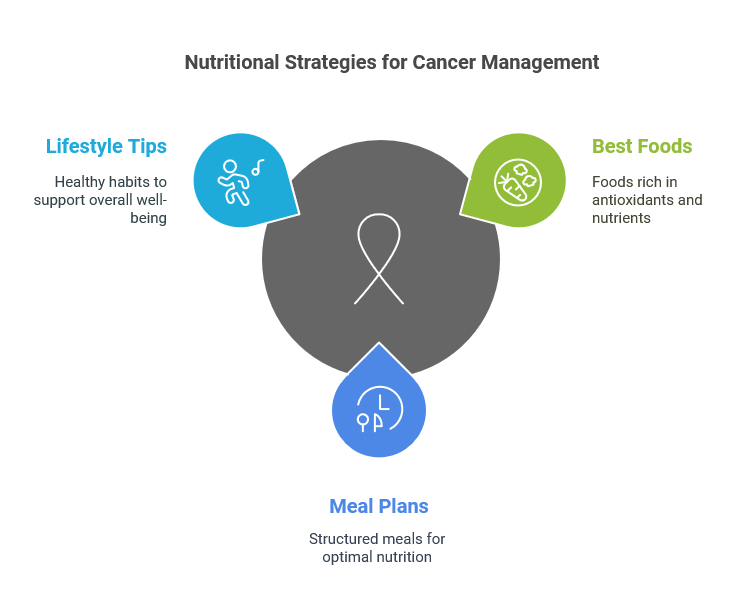
The Essentials: Nutrition & Cancer Prevention
Cancer is a multifactorial disease that results from a combination of genetic, environmental, and lifestyle exposures. We can’t change our genetics, but we can change lifestyle factors including diet. This is one reason nutrition is essential:
- Nourishes Immune Function: Supplying the body with nutrients strengthens the immune system, helping the body target and destroy abnormal cells.
- Reduces Inflammation: Chronic inflammation is a major driver of a cancer-friendly environment. Anti-inflammatory foods reduce this risk.
- Regulates Hormones: Certain cancers like breast cancer and prostate cancer are hormone-sensitive. Role of
- Diet: What you eat can also balance hormone levels.
- Including Antioxidants: Foods high in antioxidants help neutralize free radicals, leading to decreased DNA damage that may trigger carcinogenesis.
Essential Nutrients for Cancer Prevention and Management
1. Antioxidants
Antioxidants protect against DNA damage and oxidative stress. Rich sources of antioxidants include:
- Berries: Blueberries, raspberries, and strawberries are high in flavonoids.
- Leafy Greens: Spinach, kale, and broccoli are rich in vitamins A, C, and E.
- Nuts and seeds: Almonds, sunflower, and flaxseeds contain vitamin E and selenium.
2. Fiber
The high-fiber diet promotes a healthy gut microbiome and supports toxin removal. Sources include:
- Whole grains: Such as brown rice, quinoa, and oats.
- Legumes: All lentils, chickpeas, black beans
- Fruits and Vegetables: (apples, carrots, sweet potatoes.
3. Omega-3 Fatty Acids
Omega-3s help decrease inflammation and have been associated with a reduced risk for some cancers. Incorporate these foods:
- Fatty Fish: Salmon, mackerel and sardines
- Chia Seeds and Walnuts: Plant-based omega-3 sources
- Flaxseed Oil: Use on salads and smoothies.
4. Phytochemicals
Bioactive mixtures from plants that have anticarcinogenic properties are called phytochemicals. Examples include:
- Cruciferous vegetables: broccoli, cauliflower, and Brussels sprouts are sulforaphane sources.
- Garlic and Onions: are high in allicin, which has anticancer properties.
- Green Tea: High in catechins, potent antioxidants.
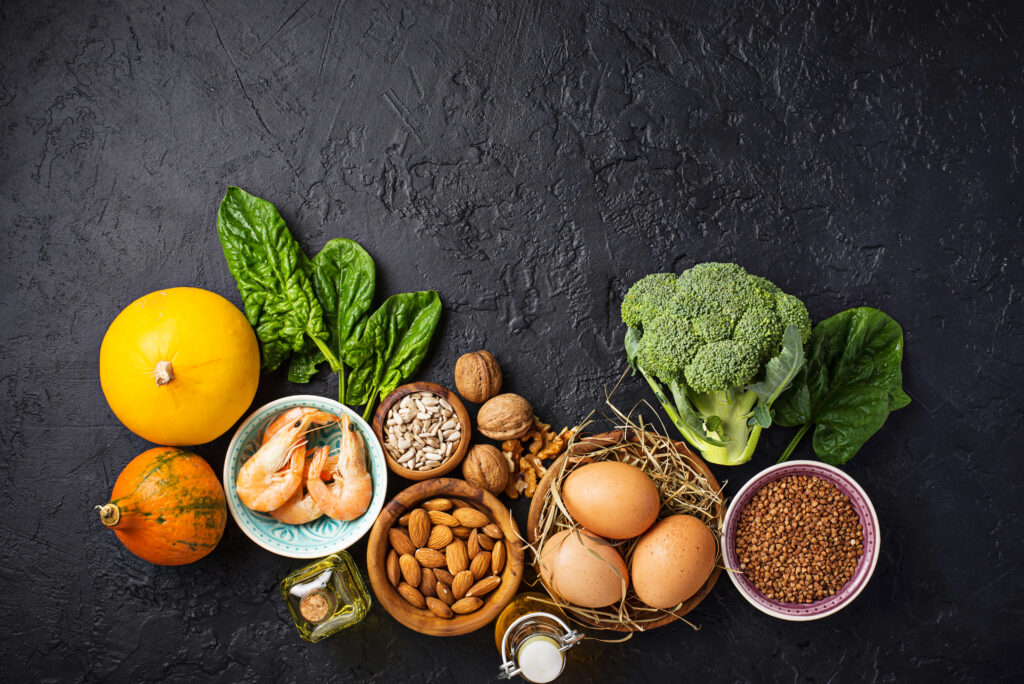
Guide to Cancer Prevention Diet: Eating For Your Health
Do not panic; a cancer prevention diet does not have to mean entering into a rigid regime; it takes small discrepancies, keeping staples that bring development, help your immune system, and defend your top of foods that may lead to all the attributions of cancer.
Though no one diet will keep you safe from cancer, eating a balanced diet full of healthy nutrients can greatly fight the risk of some cancers. Here’s what to note when getting started as a cancer-fighting eater:
1. Focus on Plant-Based Foods
A healthy diet with plenty of fruits, vegetables, and whole grains provides important nutrients and antioxidants that help protect cells from damage. They are known to neutralize free radicals, dangerous molecules that contribute to oxidative stress, damaging cells and eventually leading to cancer.
Best Plant-Based Choices:
- Berries: Blueberries, strawberries, and raspberries contain antioxidants, such as anthocyanins and flavonoids.
- Leafy Greens: Spinach, kale, collard greens, and arugula contain vitamins, minerals, and fiber that promote immune function and cellular repair.
- Cruciferous vegetables: These are broccoli, cauliflower, Brussels sprouts, and cabbage that contain cancer-fighting compounds such as sulforaphane.
2. Include Whole Grains
Whole grains such as brown rice, quinoa, oats, and barley are nutrient-dense and rich in fiber, vitamins, and minerals. Fiber assists with digestive health, something that’s key to reducing the risk of colorectal cancer. Whole grains also stabilize blood sugar and decrease inflammation.
3. Healthy Fats Are Key
Healthy fats (monounsaturated and polyunsaturated fats) are present in olive oil, avocado, and nuts. Omega-3 fatty acids from fatty fish like salmon, sardines, and flaxseeds have anti-inflammatory effects that might lower cancer risk. Minimize trans fats and lower saturated fats, which are inflammatory and promote cancer.
4. Eat Lean Proteins
While animal proteins can be included in a healthy diet, lean sources such as chicken, turkey, and fish should be prioritized, along with plant-based proteins like beans, lentils, and tofu. Limit red meat and processed meats (like bacon, sausages, and hot dogs), which have been associated with a higher risk of colorectal and stomach cancers.
Protein Choices:
- Legumes: Beans, lentils, and chickpeas are protein and fiber-rich while low in fat.
- Fish: High in omega-3 fatty acids, which curb inflammation.
- Nuts and seeds: Almonds, walnuts, chia seeds, and flaxseeds provide healthy fats, antioxidants, and protein.
5. Keep Added Sugar and Processed Foods to a Minimum
Eating an excess of sweet and processed foods can cause weight gain, obesity, and inflammation, which are all risk factors for cancer. Instead, opt for whole, unprocessed foods. Reducing sugar can help prevent insulin resistance, which has been linked to several cancers.
6. Drink Plenty of Water
Finding Ways To Keep Hydrated Is Key To Overall Health Water aids in digestion, detoxification, and ensuring cells function well. Try to drink at least bowls of water every day, and cut back on sugary drinks and alcohol because they can raise your risk of certain cancers, such as liver and breast cancer.
7. Reduce Alcohol Consumption
Heavy drinking is an established risk factor for mouth, throat, liver, breast, and colon cancers. Limit or eliminate alcohol use. If you drink, limit yourself to no more than one drink a day for women and two for men.
8. Poison Cancer With The Right Spices And Herbs
Some spices and herbs have compounds that also lower cancer risk:
- Turmeric: This spice contains curcumin, an antioxidant and anti-inflammatory compound that positively affecting cancer prevention.
- Garlic: Allicin has demonstrated anticancer effects, especially in decreasing the risk of stomach and colon cancers.
- Ginger: Ginger also has anti-inflammatory and antioxidant properties, and it can inhibit the growth of cancer cells.
9. Avoid Red Meat and Processed Meat in Strictly Limited Quantities
Colorectal cancer risk has been associated with processed meats (such as hot dogs, bacon, and sausage) and overconsumption of red meat (beef, pork, and lamb). If you eat meat, choose lean cuts and aim to add more plant-based proteins to your diet.
10. Healthy Cooking Methods
It matters how you cook your food. And you should steer clear of deep frying, which creates harmful chemicals associated with cancer. Instead, choose healthier cooking methods like steaming, grilling, roasting, or simply sautéing with healthy oils (like olive oil).
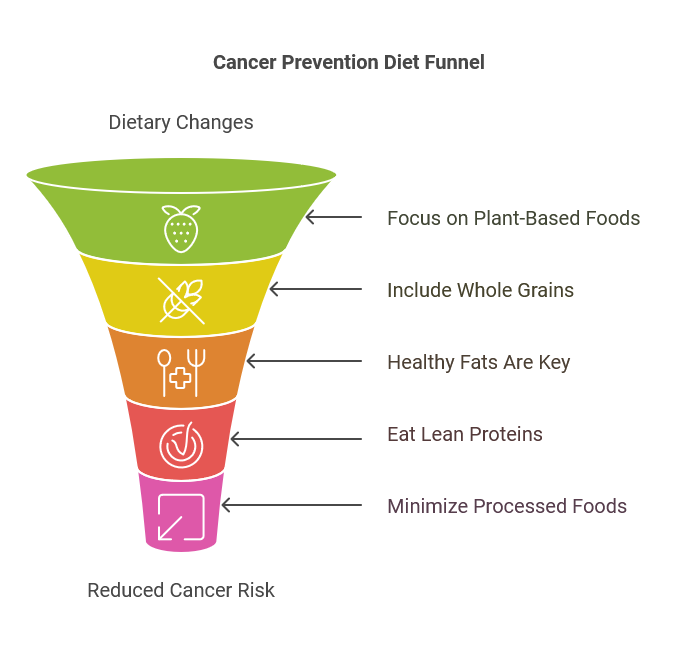
Cancer Prevention Diet Plan — Sample Menu
Here’s what a day of a cancer prevention diet might look like:
Breakfast:
- Oatmeal with berries, chia seeds, and a handful of walnuts.
- Green Tea or water.
Lunch:
- Some grilled chicken breast with mixed greens (spinach, kale) salad, avocado, tomatoes, and cucumbers drizzled with olive oil and lemon juice.
- A side of quinoa or brown rice.
Snack:
- Apple cuts with almond margarine or a small bunch of blended nuts.
Dinner:
- Salmon seasoned with Turmeric and garlic, baked with roasted broccoli and steamed carrots.
- Bread, either sweet potato or whole grain.
Drink: A lot of water throughout the day while keeping sugary beverages to a minimum.
A cancer prevention diet emphasizes rich whole foods, with an emphasis on minimizing your intake of processed foods and red meats, as well as limiting alcohol.
A healthy diet, a healthy weight, regular physical activity, and avoiding smoking are all key lifestyle modules to reduce the risk of high cancer, along with diet.
Remember to seek personalized dietary advice from a health professional or nutritionist, particularly given any medical concerns affecting you.
Best Foods to Eat to Fight Cancer
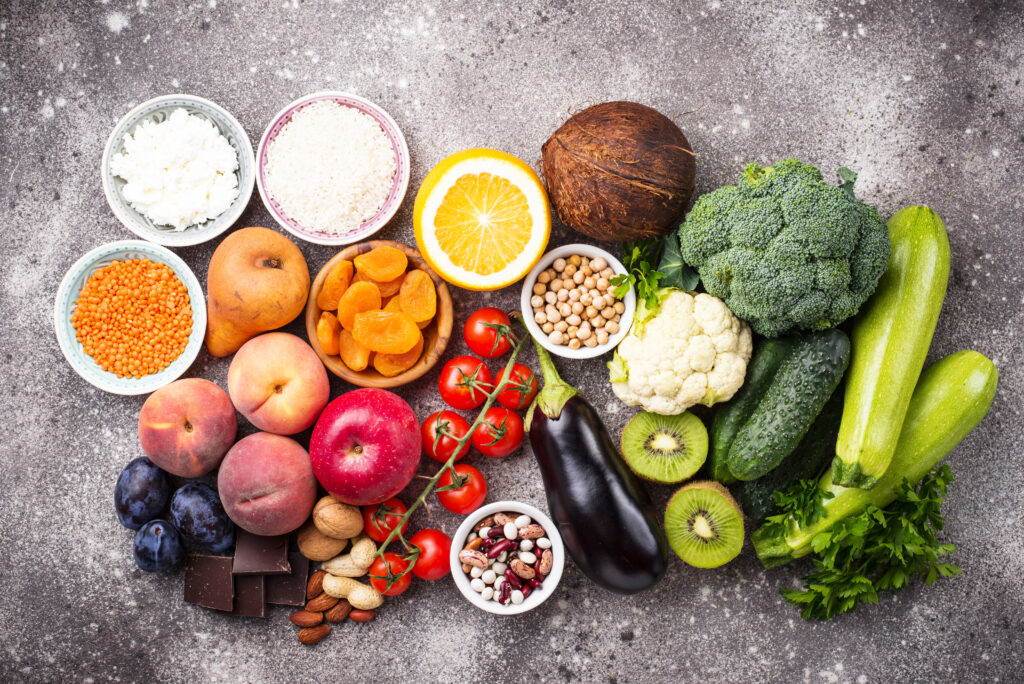
Healthy choices promote cancer prevention; certain foods can help increase your body’s defenses against the disease. These substances are believed to reduce cancer risk by battling inflammation and cellular damage and improving general health.
Some of the best anticancer foods you should eat in your daily diet are:
1. Berries (Blueberries, Strawberries, Raspberries)
Berries are high in antioxidants, including anthocyanins, which may have anti-inflammatory effects and help to protect cells from oxidative stress. Studies have shown that berries may help decrease the risk of several cancers, including breast and colon cancer.
2. Cruciferous Vegetables (Broccoli, Cauliflower, Kale)
Cruciferous vegetables contain sulforaphane, which targets cancer stem cells and prevents tumor growth. Eating these vegetables also gives you fiber, which promotes good digestion and lowers the risk of colon cancer.
3. Garlic
Sulfur compounds in garlic, like allicin, have anticancer effects. According to research, regular consumption of garlic may lower the risk of some cancers (such as stomach, colon , and esophageal).
5. Tomatoes
Tomato is high in lycopene, which, as an antioxidant, is said to reduce prostate cancer risk. Cooking tomatoes increases the bioavailability of lycopene, so you get even more benefits.
6. Green Tea
Green Tea is a derivative of the Camellia sinensis plant, which contains catechins, potent antioxidants associated with a lower risk of certain cancers, including breast, prostate, and colorectal cancer. It may protect cells from DNA damage when you drink it regularly.
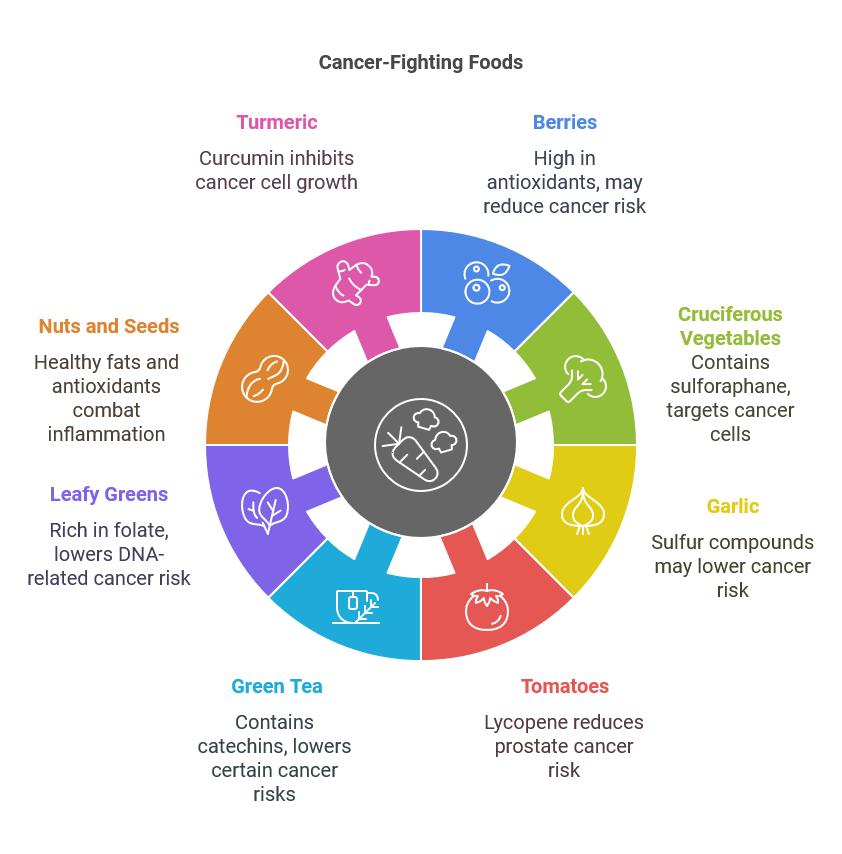
6. Leafy Greens (spinach, Swiss chard, arugula)
Leafy greens contain high levels of folate, a B vitamin that helps maintain the integrity of our DNA and may lower the risk of some cancers, including colon cancer. They are also rich in vitamins, fiber, and minerals to keep you healthy.
7. Nuts and Seeds (Almonds, Walnuts, Flaxseeds)
Healthy fats, antioxidants, and fiber are abundant in nuts and seeds. They have been shown to combat inflammation and may reduce the risk of cancer, particularly breast and prostate cancers. In particular, walnut consumption has been associated with decreased tumor growth.
8. Turmeric
Curcumin, the dynamic fixing in Turmeric, has calming and cancer prevention agent impacts. It may inhibit the growth of cancer cells and promote apoptosis (programmed cell death) in cancer cells. Especially when paired with black pepper, Turmeric significantly increases curcumin absorption in your body.
9. Carrots
Carrots are an excellent source of beta-carotene, a potent antioxidant that helps protect cells from damage by free radicals. Beta-carotene has been associated with a lower risk of lung and prostate cancers, particularly with ongoing intake.
10. Citrus Fruits (Oranges, Lemons, Grapefruits)
Citrus fruits are rich in vitamin C and flavonoids, which have antioxidant and anti-inflammatory properties. Research indicates these fruits may lower the risk of mouth, esophageal, and stomach cancer.
11. Legumes (beans, lentils, chickpeas)
Legumes provide a good quantity of plant-based protein, fiber, and antioxidants. It promotes healthy digestion and lowers inflammation in people who eat it regularly, which has been linked to a lower risk of colorectal and breast cancers.
12. Wholegrain foods (e.g., Oats, Brown Rice, Quinoa)
Whole grains are high in fiber, a crucial substance for digestive health that reduces the risk of colorectal cancer. They also provide phytonutrients and antioxidants that may protect against oxidative stress and inflammation.
Adding these cancer-fighting foods to your diet can boost your immune system and lower your likelihood of cancer. No single food prevents cancer, but a healthy balanced diet, abundant with fruits, vegetables, whole grains, and healthy fats, can protect your body and improve overall health.
Remember to always talk to a healthcare provider or nutritionist for personalized tips about dietary changes to cancer-proof your life.
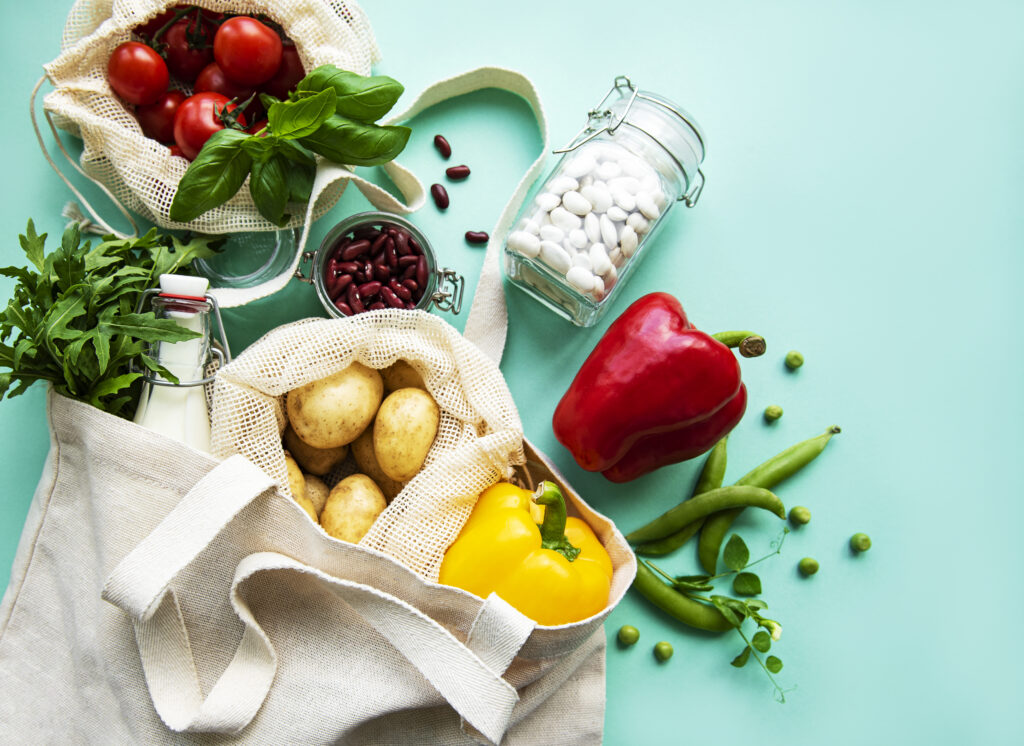
How to Create an Anticancer Meal Plan
Breakfast
- Smoothie: Spinach, frozen berries, flaxseeds, and unsweetened almond milk blended
- Whole Grain Toast: Spread with avocados and a dash of Turmeric.
Lunch
- Salad Bowl: Leafy greens, cherry tomatoes, quinoa, and grilled salmon, topped with olive oil and lemon juice.
- Side: A handful of walnuts.
Snack
- Green Tea: by itself or dark chocolate (85% cacao).
- Carrot Sticks: With a hummus dip.
Dinner
- Grilled Chicken or Tofu: With garlic, Turmeric, and herbs.
- Side: Broccoli steamed, then sautéed with sesame and mustard; sweet potatoes roasted.
- Dessert: Mixed berries in a bowl.
Lifestyle Tips to Add to Your Anticancer Diet
- Stay Hydrated: Water will help to eliminate toxins.
- Move A Lot: Physical activity improves circulation and boosts immunity.
- Reduce Processed Foods: Clear high sugar, trans fats, and fake foods.
- Don’t smoke and limit alcohol: They are major cancer risks.
- Eat Mindfully: Take your time, enjoy your food, and pay attention to nutrient density.
How to fight cancer with nutrition: Comprehensive Dietary Guidelines on How to Promote Your Health
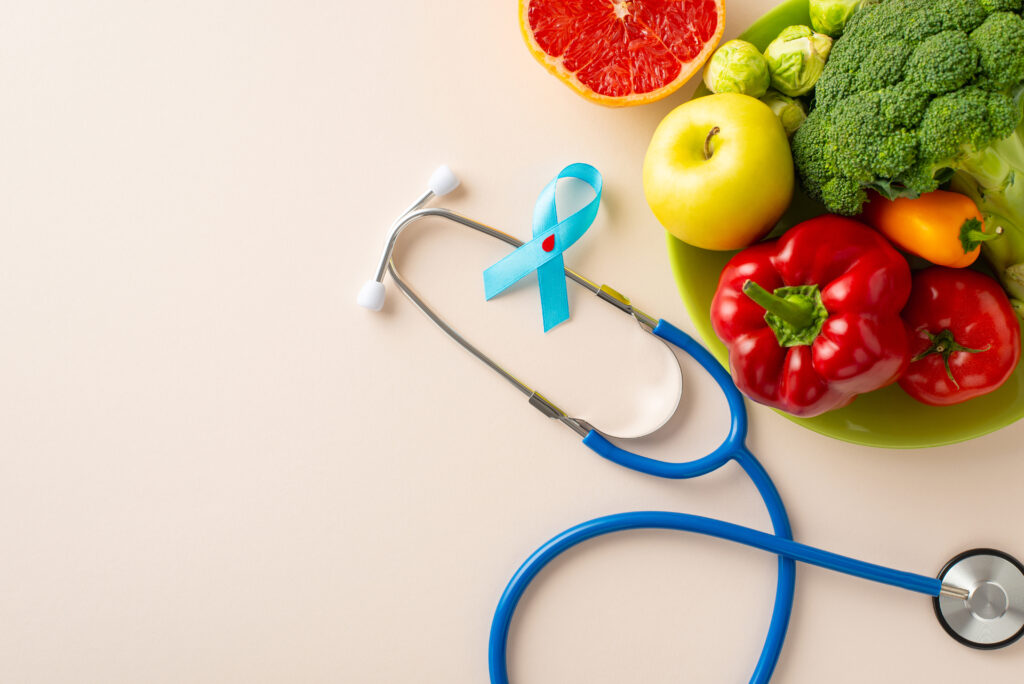
A healthy, balanced diet is important for everyone, but it becomes even more vital for a person living with cancer. Eating a nutritious diet throughout treatment and recovery can help keep symptoms in check, provide energy, support the immune system, and contribute to overall health.
The cancer-diet-friendly eating plan focuses on whole and nutrient-rich foods that deliver crucial vitamins, minerals, and antioxidants that can support healing and minimize inflammatory responses.
Here’s a guide to cancer-related healthy eating, whether you’re looking to help prevent cancer, support treatment, or aid recovery:
1. Eat a diet that is plant-based and high in nutrients.
Studies show that diets full of fruits, vegetables, whole grains, legumes, and nuts supply the body with potent antioxidants and phytochemicals that help combat oxidative stress and inflammation, two contributing factors to cancer. These foods also aid in immunity and general wellness.
Key Foods to Include:
- Fruits and Vegetables: Fill a portion of your plate with vivid products of the soil.These foods are also high in vitamins, minerals, and antioxidants. Bitter vegetables, especially dark, leafy greens such as spinach, kale, and Swiss chard, are particularly good for smoking.
- Cruciferous Vegetables: Broccoli, cauliflower, Brussels sprouts, and cabbage are rich in compounds such as sulforaphane that can help lower cancer risk and aid in detoxification.
- Berries: Blueberries, strawberries, and raspberries are all high in antioxidants, which help fight off free radicals and reduce inflammation.
2. Repair and Recovery Lean Proteins
Protein is an important nutrient for the body’s repair and recovery processes. When receiving treatment for cancer, including chemotherapy or radiation therapy, protein needs are estimated to be higher than normal to spare muscle loss and immune suppression and to aid in recovery.
Healthy Protein Sources:
- Fish: Fatty fish, such as salmon, mackerel, and sardines, are high in omega-3 fatty acids, which have been found to have anti-inflammatory effects and support immune function.
- Poultry: Skinless chicken and turkey are low-fat sources of protein.
- Legumes: (beans, lentils, chickpeas) are a source of protein fiber and are less difficult to digest for some people while undergoing treatment; tofu, tempeh, and edamame are plant-based proteins.
3. Healthy Fats — Energy and Protection for Cells
Healthy fats from nuts, seeds, avocados, and olive oil help support cell structure and functioning. They also give sustained energy, which can be particularly relevant during cancer treatment when fatigue is frequently a sign.
Good Sources of Healthy Fats:
- Olive oil: Loaded with monounsaturated fatty acids and antioxidants, olive oil decreases inflammation.
- Avocados: Rich in good fats and fiber, avocados give you energy and help keep your heart healthy.
- Nuts and seeds: Pecans, almonds, chia seeds, and flaxseeds are great types of omega-3 unsaturated fats and protein.
4. Fiber and Energy from Whole Grains
Whole grains such as quinoa, brown rice, barley, and oats are high in fiber and offer slow-burning energy. They promote digestive health, which is important for all, but especially for cancer patients and for patients undergoing treatments that can be hard on the gastrointestinal system.
Whole Grain Options:
- Brown Rice and Quinoa: These whole grains are high in fiber, B vitamins, and minerals for longer-lasting energy.
- Oats: Oats are a good source of soluble fiber, easy to digest, and help regulate cholesterol levels.
- Whole Wheat Bread and Pasta: Choose wholegrain versions for more fiber and nutrients.
5. Detoxifying and Easing Symptoms with Hydration
It’s important to stay hydrated, especially during cancer treatment. Water flushes toxins from the body, supports digestion , and keeps cells operating efficiently. You must drink plenty of fluids throughout the day if you’re receiving treatment that dehydrates you (such as chemotherapy).
Hydration Tips:
- Keep hydrated as much as possible plenty of water, herbal teas, and clear broths.
- Add some fresh lemon, mint, or cucumber for flavor if regular water doesn’t sound good.
- Coconut water can be a good natural source of electrolytes, especially if you’re tired or dehydrated.
6. Staying Away from Processed and Refined Foods
In addition to prioritizing whole, nutrient-dense foods, limiting processed and refined foods is key. These foods include sugary snacks, sodas, and fast food, and can contribute to inflammation, weight gain, and other health problems that could interfere with recovery from cancer.
Foods to Avoid:
- Processed Meats: Foods like bacon, hot dogs, and deli meats can contain high levels of sodium and unhealthy fats, and they have been associated with an increased risk of some cancers.
- Sugary Snacks And Beverages: A high sugar intake can weaken the immune system and cause inflammation. Choose fresh fruits instead to satisfy sweet cravings.
- Refined carbs: White bread and pasta, as well as pastries made with refined flour, can lead to blood sugar surges, which may interfere with cancer treatment and recovery.
7. Herbs and Spices That Heal
Several herbs and spices are known for their anti-inflammatory, antioxidant, and immune-boosting effects, which can benefit cancer patients. They’re also seasoning that can be added easily to meals to add flavor and even help heal the body.
Powerful Spices and Herbs:
- Turmeric: Curcumin is a powerful anti-inflammatory and antioxidant. When added to soups, curries, and smoothies, Turmeric can also boost immune health.
- Garlic: A proven anticancer food, garlic carries sulfur compounds useful in preventing cancer. Fresh garlic is a perfect culinary addition because it improves flavor and health.
- Ginger: It’s good for easing nausea (a common side effect of chemotherapy) and has anti-inflammatory benefits.
8. Smaller, More Frequent Meals
Because cancer treatment can sometimes diminish appetite or create digestive problems, focus on eating smaller but more frequent meals during the day to keep energy up and make sure the nutrients you need to ward off cancer and recover are available.
Meal Tips:
- Instead of having three big meals, try having 5–to 6 small meals daily.
- If treatment has changed your taste, aim for various flavors and textures to make meals more appetizing.
- Opt for nutrient-dense snacks such as smoothies, protein bars, or small portions of nuts and seeds.
Nutrition is vital to cancer prevention, treatment, and recovery, so a healthy diet is essential. A diet rich in whole, nutrient-dense foods, complemented by hydration, and avoiding unhealthy or processed foods allows your body to fight cancer and manage general health.
The dietitian can help tailor recommendations to your situation, especially if you are receiving cancer treatment.
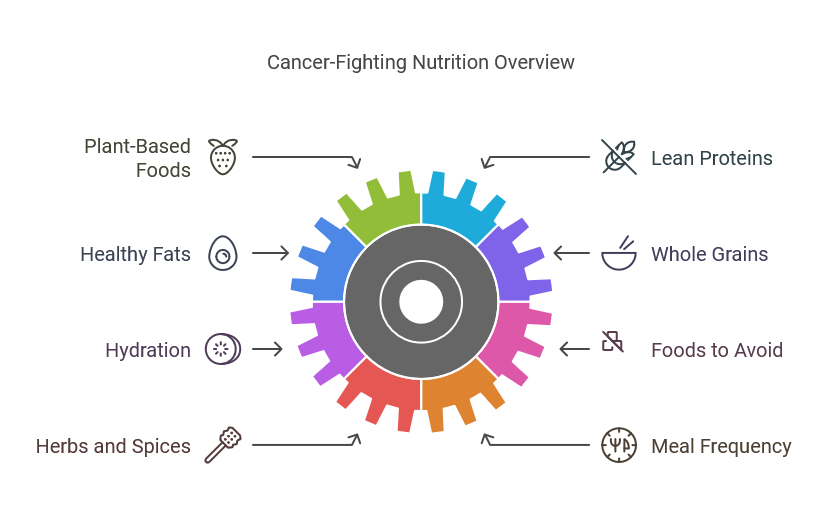
Q&A (Questions & Answers)
1. Can nutrition cure cancer?
No single diet will cure cancer, of course, but appropriate nutrition aid treatment can enhance the quality of life and may decrease the chances of recurrence.
2. What not to eat during cancer treatment?
Yes, again, limit processed meats, sugary beverages, and high-fat fried foods because they can promote inflammation and interfere with treatment efficacy.
3. Where to begin when starting an anticancer diet?
Add more fruits, vegetables, whole grains, and lean proteins to your meals. Slowly eliminate processed and sugary foods from your (and journal) for two weeks.
4. Are supplements a substitute for a healthy diet?
While supplements can be beneficial, they do not replace a balanced diet. Whole foods are the way to go for maximum benefit.
5. How much does stress contribute to cancer?
Chronic stress can suppress the immune system and promote inflammation. Combine your nutrition plan with stress-reduction techniques such as meditation and yoga.
Conclusion
Although nutrition plays an important role in cancer prevention and treatment, it is not only the avoidance of foods but rather, it’s an overhaul of your diet that focuses on nutritious, anti-inflammatory, and immune-boosting foods. Although food is not a cure-all, it is a strong ally in health and wellness.
You give your body the means to thrive by making the right choices. As always, leaving comments and asking questions helps other readers, so please do.
